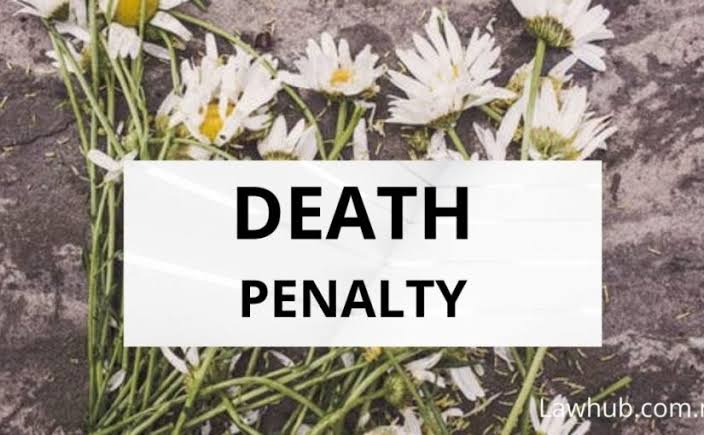N.B. This article is particular to Nigeria.
Death Penalty/ Capital Punishment
Should the death penalty be withdrawn or upheld in Nigeria? What do you think? This post considers the death penalty.
For decades, the quest to achieve the maintenance of peace & order have been at the topmost of govt policies. However, this has been crushed by the incessant rate of crimes hitting the country. On 26th July 2018, George kirkham stated in “New-York times” that crimes in the society may never diminish, it grows in geometric progression.
The trial of criminal activities has in turn birthed the preferment of punishments. Whose aim is to curb the heavy rate of crime involvement. The juxtaposition of crimes and punishment has however been founded on the degree of the crime committed by the individual. Little wonder, Lord Atkin in the case of Proprietary trade association V. Attorney general of Canada poignantly quipped
“The criminal quality of an act cannot be determined by reference to any standard but one is the act prohibited by penal consequences”
Thus, crimes which go overboard have been meted the death penalty. Otherwise known as the capital punishment.
The capital punishment is the state authorized killing or execution of an offender consequent on conviction & sentence of death imposed by a competent court. Additionally, such sentence cannot be carried out until the convict had exhausted his right of appeal of a sentence of death.
There are quite a large number of scholarly b& judicial on the lawfulness of capital punishment. Some make argument on Moral & philosophical basis while some make their argument on international law basis this controversy has continued; to linger as an issue within Nigeria and internationally likewise.
Is it in any way justifiable within legal frame work to lawfully execute convicts? This question has been diffused into two stand-point
- Retentionist argument
- Abolitionist argument
Abolitionist on Death Penalty
This a view held by those in the abolitionist realm, they believe the death penalty is the worst violation of human right because “right to life” is the most important and it goes further to inflict the condemned with a phycological torture.
The abolitionists refer to it as “Cruel, inhumane & a degrading punishment” presently, 103 countries of the world have completely abolished the death penalty “dejure” for all crimes, six have abolished it for ordinary crimes while maintaining it for special circumstances such as war crimes & 30 are abolitionist in nature.
In the European union, Article 2 of the charter of fundamental rights prohibits the use of capital punishment. The council of Europe which has 47member states has sought to abolish the use if the death penalty by its members absolutely through protocol 13 of the European convention on human rights. In same vein, the united nations general assembly adopted in 2007,2008, 2012 & 2013, non-binding resolutions calling for a global memoratium on execution.
Those in the abolitionist realm have gone further to state their reasons for this archaic mode if punishment.
- The death penalty is cruel outdated & pre-modal
- Some argue that it is morally wrong and against right to life
- When a govt kill, it sends a signal to the people that they can also kill
- Some believe it places a low value on life and creates a vicious circle of murder.
- One of the strongest reasons of the abolitionist is the imperfect judicial system for instance in UK a man named Timothy Evans was hanged in 1950 after being convicted for two murder that had been committed by his neighbor. After wards this made the UK to abolish the death penalty.
Retentionist – Why some insist that the death penalty should stay
This opinion is popularly held by the retentionist as it is believed that punishment should be “an eye for an eye” retentionist center their argument around the justification of fairness, retribution, deterrence, economy and popularity.
In the case of Gregg v. Georgia the court held that death penalty isn’t cruel and not an unusual punishment. In Nigeria, the signing not the death sentence by Oshiomole has been praised by proponents of this school. While abolitionist raise “racial discrimination” as a ground, the court in Mcckleskey V. Kempheod that statistical evidence of racial discrimination in death sentencing couldn’t establish a violation if the 14th amendment of their constitution.
Presently about 56 countries have retained the capital punishment. Although most nations have abolished it, over 60% of the world’s population still live in countries were death penalty is retained. E.g China, India, japan, & Indonesia. The UN introduced a resolution during the general assembly’s 62nd session calling for a universal ban.
In this resolution, 52 countries voted against the proposed universal ban. A range if amendment subsequently proposed by a small minority of pro-death countries were overwhelmingly defeated.
The views proffered by the retentionist in support of death penalty include that:
- Capital punishment actually deters crime
- Some crimes deserve nothing less than capital punishments
- The nexus of carrying out capital punishment is not as inhumane as it used to be. It should be noted that in carrying out death sentence, there is no easy or humane way.
- We are in the time of due process and constitutional democracy
- It is necessary to state that capital punishment may make for vendetta or self-help.
The administration of criminal justice act (2015) has provided for capital punishment bin some of its sections for instance, section 402(1)(2). Section 4 also provides for the position of pregnant women.
In conclusion, a poll was conducted in Washington & released in July 12th 2018, it found that 69% preferred the idea if life imprisonment to death penalty. The argument as regards the justifications of the death penalty remains of utmost importance. Regardless if whatever opinions are proffered, its relevance cannot go into Oblivion.
Contributed by: Abdulganiyu Ismail (AKA) Mastermind
Prepared and Written by: Ucheakonam Chijioke Joshua (CJ)


Leave a Reply